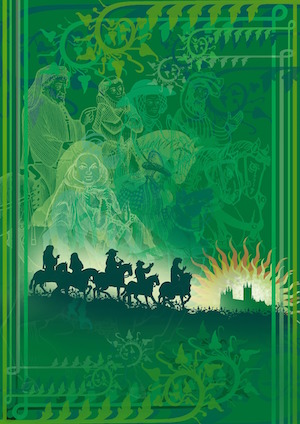I remember the day the light went on.
I have been told that using a colloquialism is an excuse for real words, but in this case, the words are exactly what they mean.
The light really did come on.
I attended high school in a rural town surrounded by a large farming community. Survival with hard physical labour for an unpredictable harvest understandably often out-weighed the value of the fine arts. The local weather forecast eclipsed the importance of reading novels.
Like my parents, I had little knowledge of 14th century Medieval classics.
It was a regular school day.
An English Literature Class: Grade 11, I think.
The day is stored in my memory data as a photograph and a brief video.
Other students were in the class, but they are not in the picture.
Just me, Chaucer, and the teacher.
I never thanked this teacher, and she likely never knew how powerful her lecture was, at least for one student – me. Besides that one day with the ten-minute clip of the light coming on, I have no recollection whatsoever of being in any of her other classes I might have paid more attention, at least to her name, if I had realized that the light would never go out, and that both she and her teaching would matter so much some forty years later.
To be dedicating a whole article to this teacher and not even know her name is somewhat embarassing. Other teachers’ last names, like Barr, Sheets, and Jenkins, for example, are still embedded in my brain, but I cannot recall hers. She may have been Miss or Mrs., in those pre-Ms. days, and her surname might have started with the letter J.
Lest she be unnamed, I will call her Ms. ? J.
Ironically, I remember how Ms. ? J. looked on that day. Tall and well-groomed, she wore pumps, possibly black, and a dark-coloured belted dress, tailored to fit snugly but modestly on her slender figure. I’m not sure why I noticed or still remember, except that her appearance seemed to command attention to detail and all matters of import.
I thought her to be somewhat austere in manner, but most likely she just took her profession and subject matter seriously and did not waste time on trivial conversations or silly hilarities. She was there to unfold the writings of Chaucer, after all.

We were studying The Canterbury Tales.
I remember the title, at least, and the fact that there were a lot of characters in the story. Other than that, the words were as incomprehensible as a foreign language.
Ms. ? J. was lecturing, and I was listening, but not understanding.
Then she started to describe one of the fictitious persons in detail. The role and occupation of the character were apparently incidental, as I cannot remember either, although it may have been the parson or the cook. What I do remember is that the teacher showed how Chaucer looked beyond the person’s rank and title to see the real human being underneath the outward persona.
In words much fancier than mine, Ms. ? J. explained that the author did not directly tell us what the character was like. Instead, Chaucer elaborated on the individual’s appearance, conversation, interactions, and life experiences so that we, the readers, would be able to discern and understand the supposedly fictional person’s attitudes, personality, convictions, and character.
Suddenly, I got it, from my seat in the far left row next to the boring beige wall.
While the teacher’s voice continued on in the otherwise silent classroom,
I stared at her, mesmerized, from my sideways angle looking to the right, and believe I remained unmoving.
Inside my head, though, not just one light went on,
but rather a cascade of colourful fireworks,
exploding like lightning as new revelation ignited in my mind.
Chaucer and my teacher knew something I was just finding out:
people are not defined by their roles and are not always what they seem.
I do not know how other members of my fellow human family come to this realization, but I had to be taught that I, too, could discover stories behind story by observing people’s conversations, demeanour, and actions.
And then, just as abruptly, it was over.
For all intents and purposes, I left the classroom the same as I entered,
back into the oblivion of lost memories of the rest of that ordinary day.
But, unknowingly, I had changed.

I no longer trusted my impressions of a person’s rank or appearance and wanted to know how people felt when they told stories of their experiences and adventures. I paid more attention to authors and radio commentators who brought humour and insight into otherwise boring everyday life experiences: Erma Brombeck, Peter Szowski, Stuart MacLean, and David Barry.
I read magazine editorials and newspaper columns about people baking, graduating, going to medical appointments with a fatal disease, grappling with marital disharmonies, doing menial parental household chores, struggling to obtain eye glasses in an isolated northern community, trying to remember left and right, and how one student struggling with dyslexia became a renowned eye surgeon.
I started to understand that the obvious story-event was not as important as the more subtle sub-plots that revealed character strength or lack of it. I saw how others laughed at themselves and was inspired by those who felt deeply in crisis but somehow still coped.
Eventually, I also was able to see and feel my own life experiences on multiple and sometimes complex levels. I learned to find new stories in the story.
I don’t know what grade I got on on Chaucer’s Canterbury Tales in Grade 11 English Literature, but what I learned in my life-long test about understanding human nature greatly exceeded a measureable mark followed by a percentage sign.
For that, I am grateful.
Thank you, Ms. ? J.
Photo Credits: pixabay.com
SHARE THIS:






I think her name is MIss J. Hudema.
Oh, thank you, Marilyn. If you know how or where I could contact her, please email me at [email protected]. Hope you are doing well!
Lovely!
Thanks, Kate!